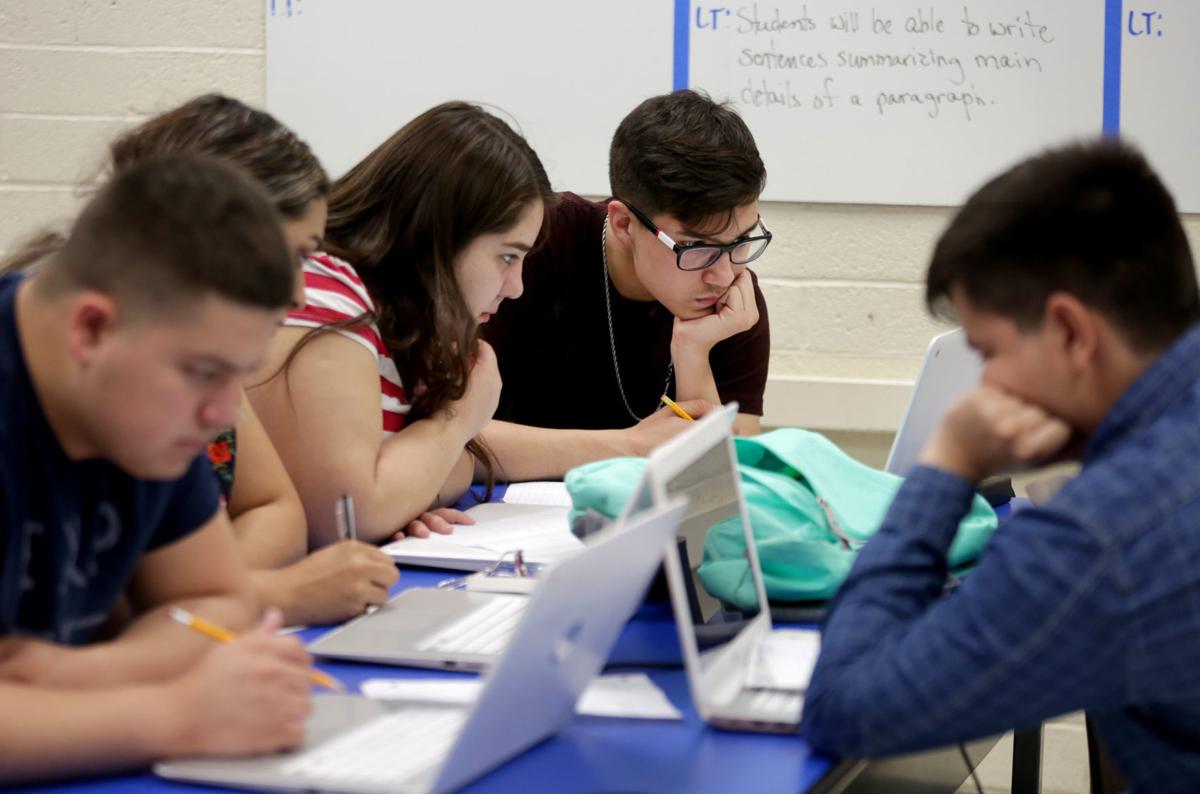Three УлшжжБВЅ-area school districts are asking voters to approve additional funding to support teacher salaries, student programming and reducing class sizes.
The Amphitheater, Sunnyside and Flowing Wells school districts are going out for new or continued budget overrides in this yearтs Nov. 5 election.
Voter-approved overrides last for seven years and come from local property taxes to fund a wide range of needs, including operating expenses such as teacher salaries and student programs; capital needs such as technology and books; and special programs like all-day kindergarten, music and physical education.
Districts typically ask voters to approve a renewal during the fourth or fifth year of an override to ensure continued funding.
Amphitheater
Amphitheater is asking voters to approve a new override and continue an existing one, which voters have consecutively said yes to since 2005. The continuance of the current override, Proposition 475, will allow the district to maintain and improve a number of services affecting students, including:
People are also reading…
тЂ Maintaining and further reducing class sizes;
тЂ Enhancing art, music and physical education programs in elementary schools;
тЂ Expanding electives and programs at the middle and high school levels, including middle school technology, science and fine arts electives, as well as high school Advanced Placement and college prep classes and STEM and fine arts courses;
тЂ Maintaining tutoring and academic intervention programs throughout the school year and summer;
тЂ Adding three to four support staff to meet growing technology and facilities needs;
тЂ Continuing to supplement employee salaries to remain competitive and attract talented educators.
Before the override originally passed, some elementary grades only had 20 minutes weekly of art, music and physical education. With the additional funds, all elementary students receive at least 50 minutes weekly in those subjects, according to district spokeswoman Michelle Valenzuela.
When the state began cutting public school budget in 2009, class sizes increased. Amphitheater was able to offset this by hiring more teachers with override money.
In Amphitheater, state cuts over the last 11 years have totaled close to $120 million, according to the district. The ongoing budget cuts from the state make overrides an important funding source for the district, Valenzuela said.
тEven with some money coming back from the state ... we really count on our community to support our schools and offset those enormous cuts,т she said.
This override would generate an estimated $7.9 million for the district annually.
Continuing the current override wouldnтt change what homeowners in the districtтs boundaries are paying in property taxes. It would continue to cost about 50 cents for every $100 of a propertyтs assessed valuation and would begin a seven-year cycle in fiscal year 2021-2022.
The estimated cost for someone with a property worth $236,370, the average price of homes in the district, is about $118 annually, according to the Pima County Superintendentтs Office.
Amphitheater is also seeking a new override with Proposition 476. If passed, it would expand all-day kindergarten to every elementary and K-8 school in the district and would reduce class sizes in kindergarten through third grade by five to eight students per classroom.
Currently, only Title 1 schools in Amphitheater, which receive additional funding for having a high percentage of low-income students, have all-day kindergarten, making it hard to stay competitive with other districts that offer district-wide all-day kindergarten, Valenzuela said.
Prop. 476 would generate an estimated $2.9 million in its first year. Homeowners would pay about 18 cents per $100 of their property value, or about $43 annually for owners of an average-priced home.
The approval of both overrides will cost property owners about $161 annually.
Sunnyside
The Sunnyside United School District is asking for an override with Proposition 474, which would raise $9.3 million in its first year т 2020-2021 т to supplement the districtтs maintenance and operations budget. The override funding would provide:
тЂ Professional development for staff to help improve student test scores;
тЂ Continued raises for teachers and compensation for teacher mentors;
тЂ Expanded internship opportunities and career training in high schools;
тЂ Increased wages for classified employees to compensate for the minimum wage increase;
тЂ Continued after-school tutoring and enrichment programs such as fine arts, library, technology, physical education and athletics.
Sunnyside has tried six times to get an override approved since 2011, but has been unsuccessful. Prop. 474 is critical for funding programs such as fine arts, library, technology, physical education and athletics, said Chief Financial Officer Hector Encinas.
In 2010, the districtтs maintenance and operations budget was more than $93 million. This year itтs $89.4 million. Due to state budget cuts and decreasing enrollment, next yearтs maintenance and operations budget without the override is projected at $83 million, Encinas said.
The maintenance and operations budget primarily funds salaries and benefits, which affect staffing levels, class sizes and student programs. If the override fails, the district will have to make some тvery tough decisions that will impact staff, programs and class sizes,т Encinas said.
тItтs extremely important that weтre able to gain back at least some budget that weтve lost over the last nine years,т he said.
If the override passes, it will cost homeowners in the district an estimated $2.08 per $100 of their homeтs value. The owner of an average-priced home at $80,960 would pay an additional $169 on their property taxes.
Flowing Wells
The Flowing Wells Unified School District is asking voters to approve the continuance of an existing override with Proposition 473, in place since 1997.
This override would maintain programs in place, including fine arts, physical education, all-day kindergarten, after-school athletics and other specialized programs, as well as maintaining class sizes, teacher salaries and an initiative that prepares students for higher learning. тItтs an important piece to our overall budget,т Superintendent David Baker said.
The budget override amount is estimated at about $3.1 million annually. Taxpayers pay about $1.53 per every $100 of their property value. A homeowner with an average-priced home of $105,550, would continue to pay about $161 annually in property taxes.


















